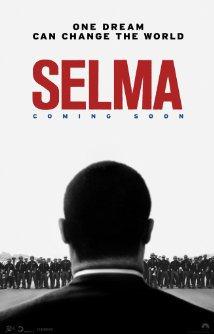 Of all of this year’s “based on actual events” best picture nominees films (there are four of them), the protagonist of Ava DuVernay’s “Selma”, the story of the history march from Selma to Montgomery, is without a doubt, the most well-known. The greatness of Dr. Martin Luther King, Jr. (David Oyelowo), is celebrated still today. Although the reality of what Dr. King did cannot be denied, he’s the stuff of myth and legend in the eyes of modern audience. A legend so grand that imagining him as an actual human being is beyond the realm of possibility for most of us. I mean, the man is a statue. It’s hard to imaging anyone who exists in statue form as a fallible human being (with a few obvious exceptions…please feel free to list them in the comment section).
Of all of this year’s “based on actual events” best picture nominees films (there are four of them), the protagonist of Ava DuVernay’s “Selma”, the story of the history march from Selma to Montgomery, is without a doubt, the most well-known. The greatness of Dr. Martin Luther King, Jr. (David Oyelowo), is celebrated still today. Although the reality of what Dr. King did cannot be denied, he’s the stuff of myth and legend in the eyes of modern audience. A legend so grand that imagining him as an actual human being is beyond the realm of possibility for most of us. I mean, the man is a statue. It’s hard to imaging anyone who exists in statue form as a fallible human being (with a few obvious exceptions…please feel free to list them in the comment section).
The most wonderful thing about “Selma” is that for fleeting moments, that myth melts away, and we see the man, Martin. It’s brief, but unbelievably refreshing. I call them fleeting, because much of this movie feels like a prolonged speech/sermon. I wish we got more human moments. One on one conversations between King and his wife, friends, and compatriots often feel like slightly more intimate speeches. Perhaps that’s how he was, but a nearly endless stream of speeches, even from a great man, can make a movie drag, and that’s a shame when it’s a movie that’s, overall, as excellent as Selma is.
This movie took a lot of flack for its portrayal of President Lyndon B. Johnson’s (Tom Wilkinson) role in making the Voting Rights Act of 1965 a reality, I won’t pretend to be well-versed in that particular history, but for my part, I think the moments between MLK and LBJ are some of the most human moments for this crusader for MLK. These are actual conversations, not one-sided monologues.
Another gloriously human moment occurs between Coretta Scott King (Carmen Ejogo) and Amelia Boynton (Lorraine Toussaint), a member of Dr. King’s Selma circle, as Coretta prepares to meet with Malcolm X. Amelia delivers the best speech in the movie, and it’s such a quiet moment:
“I’ll tell you what I know to be true; it helps me in times when I’m feeling unsure. I know that we are descendants of a mighty people, who gave civilization to the world. People who survived the hulls of slave ships and crossed vast oceans. People who innovated, created, and who love, despite pressures and tortures unimaginable. They are in our bloodstream, pumping our hearts every second. They’ve prepared you. You are already prepared.”
These quiet, poignant moments are just as impactful (if not more so) as the rousing speeches, and images of unimaginable cruelty.
This seems like as good of a point as any to talk about the director of this movie, who is a woman, a woman whose exclusion from the Oscar nominees list has been another point of contention this year. I’d just like to take this opportunity to point out that the director’s of best picture nominees “Whiplash”, “American Sniper”, and “The Theory of Everything” were also excluded from this category. So, while she may have deserved the nomination, it wasn’t the epic snub that many have cracked it up to be. To her credit, Ava DuVernay, has made no stink at all about the snub, her only complaint is the David Oy and she shouldn’t. The important thing here is that she’s made a great movie.
“Selma” is a beautiful and difficult movie that pulls no punches in recreating this tragic and ugly, but transformative moment in American history. To say that the brutality leading up to and during the march in Selma are difficult to watch doesn’t quite cut it. The ignorance and blind hatred brought tears of frustration to my eyes. As we all know, events in the past year have made that painfully clear. We’ve come along way, and still have a long way to go.
…bi-daily smile…
